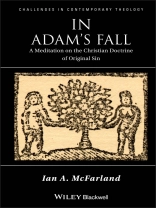IN ADAM’S FALL
Few doctrines of Christian teaching are more controversial than original sin. For how is it possible to affirm the universality of sin without losing sight of the distinct ways in which individuals are both responsible for and suffer the consequences of sinful behavior?
In considering the Christian doctrine of original sin, Mc Farland challenges many prevailing views about it. He shows us that traditional Christian convictions regarding humanity’s congenital sinfulness neither undermine the moral accountability of sin’s perpetrators nor dampen concern for its victims. Responding to both historic and contemporary criticism of the doctrine, In Adam’s Fall reveals how the concept of original sin is not only theologically defensible, but stimulating and productive for a life of faith.
Drawing on both the classical formulations of Augustine and the Christology of Maximus the Confessor, Mc Farland proposes a radical reconstruction of the doctrine of original sin – one that not only challenges contemporary Western visions of human autonomy but emphasizes the integrity of each individual called by God to a unique and irreplaceable destiny. Engagingly written and infused with scholarly sophistication, In Adam’s Fall offers refreshingly original insights into the contemporary relevance of a doctrine of Christian teaching that has inspired fierce debate for over 1, 500 years.
สารบัญ
Preface.
Acknowledgments.
Part I: Setting the Stage: The Problem of Original Sin:.
1. Creation Gone Wrong: Thinking about Sin.
A Doctrine Grown Strange.
Biblical Configurations of Sin.
Contemporary Attempts to Reclaim Sin-Talk.
Original Sin and Actual Sin.
2. Original Sin as Christian Doctrine: Origins, Permutations, Problems.
The Emergence of the Doctrine.
The Augustinian Turn.
Augustinian Revisions.
Assessment.
Part II: Reconfiguring the Debate: Sin, Nature, and the Will:.
3. Augustine of Hippo: Willing and the Ambiguity of Desire.
Augustine’s Views in Outline.
Concupiscence: Humanity Internally Divided.
The Fall: Humanity Temporally Divided.
Assessing Augustine’s Doctrine of the Will .
4. Maximus the Confessor: Willing Is Not Choosing.
Maximus’ Christology in Context.
Dyothelite Christology in Outline.
Maximus’ Analysis of the Will.
Maximus’ Interpretation of Christ’s Willing.
Anthropological Implications.
Conclusion.
5. The Status of Christ’s Will: Fallen or Unfallen?.
The Question in the Tradition.
Preliminary Assessment.
The Problem of Christ’s Will.
Theological Implications.
Part III: Reconstructing the Doctrine: Original Sin in Christian Practice:.
6. Original Sin and Human Nature: Solidarity in Sin.
Original Sin and the Damaged Will.
The Problem of the Origin of Original Sin.
Reconceiving the Ontology of Original Sin.
7. Original Sin and the Individual: Being a Sinner.
The Scope of Sin.
Sin and Agency.
From Actual Sin to Original Sin.
8. Original Sin and the Christian Life: Confronting Sin.
From Original Sin to Actual Sin.
Original Sin as Unbelief.
Vocation and the Defeat of Sin.
Conclusion.
References.
Index.
เกี่ยวกับผู้แต่ง
Ian A. Mc Farland is Associate Professor of Systematic Theology at Emory University’s Candler School of Theology. Mc Farland studied theology at Union Theological Seminary in New York, the Lutheran School of Theology at Chicago, and Yale University. He is the author of Difference and Identity: A Theological Anthropology (2001) and The Divine Image: Envisioning the Invisible God (2005).







![ปกของ Brian Schrag & Julisa Rowe: Community Arts for God's Purposes [Chinese] 貼近神心意的社群藝術 ปกของ Brian Schrag & Julisa Rowe: Community Arts for God's Purposes [Chinese] 貼近神心意的社群藝術](https://static.worldofdigitals.com/thumb_webp/740/9781645083740.webp)




